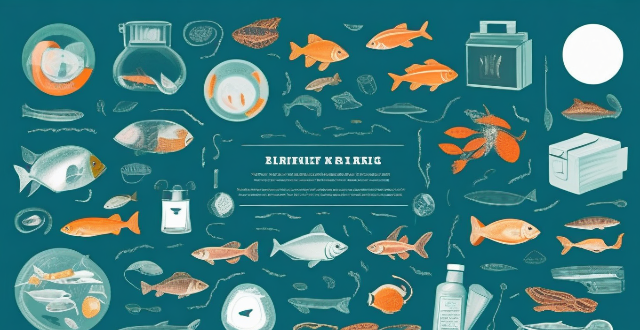The text discusses the impact of plastic pollution on marine life and ecosystems, including entanglement and ingestion by animals, chemical pollution from toxic additives, habitat destruction, food chain disruption, economic impacts on tourism and fishing industries, aesthetic and cultural impacts on coastlines and ocean environments, and solutions and mitigation efforts such as reducing plastic use, improving waste management, cleanup campaigns, education and awareness, policy changes, and research and innovation.

Impact of Plastic Pollution on Marine Life and Ecosystems
Plastic pollution is a pervasive and persistent problem that affects marine life and ecosystems in numerous ways. The following are some of the most significant impacts:
Entanglement and Ingestion
- Entanglement: Marine animals such as sea turtles, seals, and whales can become entangled in plastic waste, leading to restricted movement, injury, or death. This is particularly harmful for animals that rely on their mobility to find food or escape predators.
- Ingestion: When marine animals mistake plastic debris for food, they can ingest it, which can cause internal injuries or blockages, reducing their ability to consume nourishment and ultimately leading to starvation.
Chemical Pollution
- Plastic items often contain toxic additives, which can leach into the water as the plastic breaks down. These chemicals, such as bisphenol A (BPA) and phthalates, can have endocrine-disrupting effects on marine organisms, affecting their reproduction and development.
Habitat Destruction
- Discarded plastics can accumulate on beaches and in coral reefs, altering habitats and making them less suitable for wildlife. For example, corals coming into contact with plastic can suffer from diseases and reduced growth rates.
Food Chain Disruption
- As plastic particles work their way up the food chain, they can magnify in concentration, posing increased risks to top predators like sharks, seabirds, and humans who consume seafood. This process is known as biomagnification.
Economic Impacts
- Tourism and fishing industries suffer when coastal areas are littered with plastic waste or when marine species are affected by pollution, leading to diminished fish stocks and damaged ecosystems.
Aesthetic and Cultural Impacts
- Plastic pollution detracts from the natural beauty of coastlines and ocean environments, affecting the aesthetic value and cultural significance of these areas.
Solutions and Mitigation Efforts
To mitigate the impacts of plastic pollution, several strategies are being implemented:
- Reducing Plastic Use: Adopting reusable alternatives to single-use plastics and promoting recycling efforts.
- Improving Waste Management: Enhancing garbage collection and recycling systems to prevent plastic from entering the ocean.
- Cleanup Campaigns: Organized beach and river cleanups help remove existing plastic waste.
- Education and Awareness: Raising public awareness about the consequences of plastic pollution and encouraging responsible consumption habits.
- Policy Changes: Governments enacting legislation to limit plastic production, use, and waste.
- Research and Innovation: Developing new materials that are easily recyclable or biodegradable, as well as technologies for better plastic waste management.
By understanding the multifaceted impacts of plastic pollution on marine life and ecosystems, we can work towards solutions that protect our oceans for future generations.